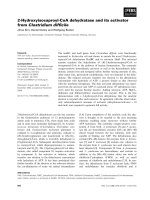Lecture 2 c program structure and its components
Bạn đang xem bản rút gọn của tài liệu. Xem và tải ngay bản đầy đủ của tài liệu tại đây (2.23 MB, 57 trang )
Ho Chi Minh City University of Technology
Faculty of Computer Science and Engineering
Chapter 2: C Program
Structure and its Components
Introduction to Computer Programming
(C language)
TS. Võ Thị Ngọc Châu
(,
)
2017 – 2018, Semester 2
Course Content
C.1. Introduction to Computers and
Programming
C.2. C Program Structure and its
Components
C.3. Variables and Basic Data Types
C.4. Selection Statements
C.5. Repetition Statements
C.6. Functions
C.7. Arrays
C.8. Pointers
C.9. File Processing
2
References
[1] ―C: How to Program”, 7th Ed. – Paul
Deitel and Harvey Deitel, Prentice Hall, 2012.
[2] “The C Programming Language”, 2nd Ed.
– Brian W. Kernighan and Dennis M. Ritchie,
Prentice Hall, 1988
and others, especially those on the Internet
3
Content
Introduction
A
Sample C Program
Coding
Styles
Data
and Standard Output Function
Data
and Standard Input Function
Data
Processing: Simple Example
Summary
4
Introduction
―In our experience, C has proven to be a
pleasant, expressive, and versatile
language for a wide variety of programs. It
is easy to learn, and it wears well as one’s
experience with it grows.‖
[2], Brian W. Kernighan and Dennis M. Ritchie
versatile = able to be used for many different purposes
5
Introduction
Design of
program
Library
(Header: *.h)
Editor
Preprocessor
Source code
*.h + *.c
(*.cpp)
Library
(Object code: *.lib; *.dll; *.so)
Linker
Compiler
Enhanced source code
*.h + *.c (*.cpp)
Executable
Program
Object code
*.obj
gcc; g++
Integrated Development Environment (IDE):
Visual Studio; Eclipse; Qt Creator; Code block; Online tool; etc
Programming tasks using the C language
6
Introduction
Design of
program
Library
(Header: *.h)
Editor
Preprocessor
Source code
*.h + *.c
(*.cpp)
Library
(Object code: *.lib; *.dll; *.so)
Linker
Compiler
Enhanced source code
*.h + *.c (*.cpp)
Executable
Program
Object code
*.obj
gcc; g++
Integrated Development Environment (IDE):
Visual Studio; Eclipse; Qt Creator; Code block; Online tool; etc
Programming tasks using the C language
7
A Sample C Program
A source code file named C2_example1.c
Purpose: display our university’s name
and course’s name on the screen
8
A Sample C Program
A source code file named C2_example1.c
Purpose: display our university’s name
and course’s name on the screen
9
A Sample C Program
Every C program requires the specific
function named ―main‖ exactly.
The body of the
―main‖ function is
enclosed in the
brackets {…}.
The body of the
―main‖ function is
made to serve the
specific purpose.
A source code file named C2_example1.c
Purpose: display our university’s name
and course’s name on the screen
The specific
extension of
C source
code files
10
A Sample C Program
A directive to the C preprocessor before the program is compiled.
<stdio.h> is used for standard input/output library functions such
as the output function printf() and the input function scanf().
This global definition section is
used for external headers.
Comments in /*…*/ or after //…
A source code file named C2_example1.c
Purpose: display our university’s name
and course’s name on the screen
11
A Sample C Program
File name: following the naming conventions
supported by the OS with the .c extension
Not include some special symbols: *, /, \, …
Avoid using special symbols even if they are allowed
Prefer descriptive names
The ―main‖ function
All the files and libraries are compiled into a single
executable program file with exactly one ―main‖
function.
The starting point for the execution of a C program
Note: The C language is case-sensitive.
MAIN vs. Main vs. main
12
A Sample C Program
The ―main‖ function
void main(){
…
…
}
Open bracket ―{― to start the body section
Corresponding close bracket ―}― to end the body
section
int main(void){
}
Place for specifying the parameters of the function
Empty or void: no parameter is specified
Data type of the value returned by the ―main‖ function
int: a status value: 0 = no error; 1 = error
EXIT_SUCCESS = 0; EXIT_FAILURE = 1
void: no value is returned
13
A Sample C Program
The ―main‖ function
void main(){
printf("Ho Chi Minh City University of Technology\n");
statement
printf("Introduction to Computer Programming\n");
statement
}
Each statement
- ended with a semicolon (;)
- stretched on multiple lines with a backslash \ at the end
- able to be grouped in the brackets {}
- not consider spaces
Several statement types
- sequence: function calling, assignment, break, continue, return, …
- selection: if, if… else, switch
- repetition: for, while, do… while
14
A Sample C Program
In addition to ―main‖, there are keywords/reserved words
in the C language.
[1], p. 42
15
A Sample C Program
The global definition section
Lines beginning with #
The #include directive tells the preprocessor to include
the contents of another file.
#include ―myHeader.h‖
A personal header file in the current directory
#include <stdio.h>
A standard library file in the standard directory \include
The #define directive to set up symbolic replacements
The #if test at compile-time to look at the symbols in
#define and turn on and off which lines the compiler uses
Function prototypes to validate function calls
Global variable declarations
16
A Sample C Program
Comments
/*…*/: multi-line comment
//…: single-line comment
17
A Sample C Program
How to get the program run for the specified purpose? *.c => a machine code file (e.g. *.exe)
A source code file named C2_example1.c
Purpose: display our university’s name
and course’s name on the screen
18
A Sample C Program
Edit:
C2_example1.c
Compile:
gcc –Wall C2_example1.c –o C2_example1
-Wall: display all the warning types along with the errors if any
-o C2_example1: specify a name for the resulting executable
program
Run:
C2_example1
19
A Sample C Program
GCC = GNU Compiler Collection
The free GNU C++: gcc.gnu.org/install/
binaries.html
GCC is available for most platforms,
including Linux, Mac OS X (via Xcode) and
Windows—via tools like Cygwin
(www.cygwin.com) and MinGW
(www.mingw.org)
Free IDEs: Micrsoft Visual Studio Express
Editions, CodeBlock, Dev C++, …
20
Coding Styles
Which
one do
you
prefer?
(A)
(B)
(C)
21
Coding Styles
The three different formatted examples for
the same purpose return the same result:
What problems might we face with (A)?
What problems might we face with (B)?
What problems might we face with (C)?
What else if the program is not defined with
just a few lines; instead, with thousands of
lines?
22
Coding Styles
Alignment
Separation (White space)
Statements are aligned level by level based on
the block {} that they are contained.
Each statement should placed on a single line.
Blank lines should be used for more clarity.
Comment
A comment is added at any level for
explanation, marking, tracking, …
Comments from the pseudo code helpful for
program development
Never abuse comments to make a program clear
23
Coding Styles
Naming conventions
Descriptive
Classified
Consistent
Agreements if any
Easy
to remember, easy to be referred, easy to
be communicated
Less
error-prone
24
Coding Styles
Naming conventions
What can you name in a C program except file
names?
Function: your defined modular processing unit
Variable: a location in memory where a value can be
stored for use by a program
Symbolic constant: constant represented as a symbol (a
string) that will be replaced with the value it stands for
A
name should reflect the content and role of the
thing you define in a C program.
25









